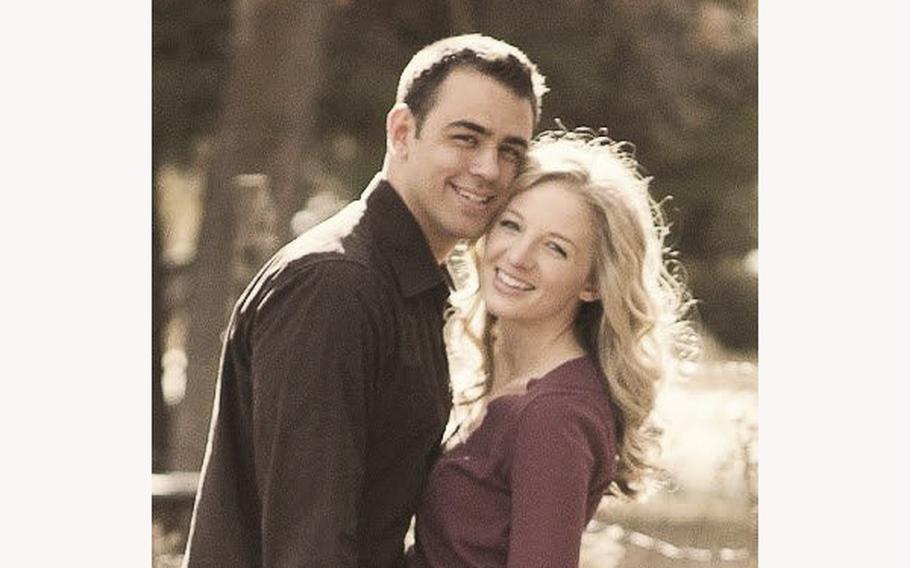
Brittany Alkonis and her husband, Navy Lt. Ridge Aldonis. (Twitter)
Holding the small hands of her three young children, Brittany Alkonis has been protesting near the White House since last week, demanding the Biden administration do more to free her husband, Ridge Alkonis, a 34-year-old Navy lieutenant imprisoned in Japan.
On Wednesday, she was at it again, wearing a blue T-shirt emblazoned with the words "Bring Ridge Home." Her children - ages 8, 7 and 4 - have stood by her, along with supporters such as Trevor Reed, the former Marine recently released from Russian custody.
Ridge Alkonis is serving a three-year prison term in Japan for a car crash that left a Japanese man and woman dead. As the United States' efforts to free Brittney Griner and Paul Whelan from Russia make headlines amid the heightened tensions of the war in Ukraine, the Alkonis family hopes their fight will draw attention to detained Americans around the world - not just those held by adversaries, but also allies.
While stationed in Japan in May 2021, Alkonis was driving home with his family and their Australian labradoodle after a visit to Mount Fuji, near Tokyo. They had gone to an area about 8,000 feet high and accessible by car. After parking, the family hiked on a mostly flat trail for a few hours, Brittany Alkonis said. On their way home at 1 p.m., Ridge Alkonis was talking to his oldest daughter as he drove.
But mid-sentence, Alkonis suddenly fell unconscious, his family said. The vehicle, going about 25 mph, veered into a parking lot and crashed into several cars that were then pushed against two pedestrians: an 85-year-old woman and her 54-year-old son-in-law. They both died. A third person, a daughter of the elderly woman, was injured. Brittany Alkonis sustained an ankle injury.
When Ridge Alkonis awoke several minutes after the crash, witnesses said his face looked pale, his family said, citing police reports. His symptoms - paleness and a loss of consciousness - align with those of acute mountain sickness, which can affect people at altitudes above 8,000 feet, according to information published by the U.S. National Library of Medicine. In June 2021, a neurologist told Alkonis that he had suffered from the illness at the time of the crash, his family said.
In October, Alkonis was sentenced to three years in jail for negligent driving. The judge overseeing the case said he had not traveled high enough to be afflicted with severe acute mountain sickness, according to local reports. Instead, she accepted prosecutors' assertions that Alkonis had been drowsy that day. An appeal failed to overturn the verdict.
Alkonis's family has accused Japanese investigators of misleading him into signing Japanese-language documents during his pretrial confinement that the family says inaccurately described Alkonis as having felt sleepy before driving that day. Alkonis was also denied access to an attorney during his initial four weeks of detention after the accident, according to his family.
Japan's Ministry of Justice didn't respond to a request for comment.
During the trials, Alkonis repeatedly told judges that he had never told law enforcement that he had felt drowsy before driving.
"It's never been harder to tell the truth," an exasperated Alkonis told his wife at the time.
Alkonis has repeatedly expressed sorrow over the deaths of the man and woman. His family, with help from friends, paid $1.65 million to the victims' relatives as restitution, they said. "They are victims, 100% innocent. They are definitely victims," Brittany Alkonis said in a phone interview this week.
But the family also says Ridge Alkonis received an unusually harsh punishment; 95% of Japanese citizens convicted of similar charges are granted suspended jail terms, according to Japanese Ministry of Justice data - meaning they aren't sent to prison.
In 2019, of the 1,252 people charged with causing death through negligent driving, only 4.6% - about 58 people - ended up doing actual prison time, according to a government white paper. The great majority - 95.4%, or around 1,194 people - received a suspended sentence.
Alkonis's case has attracted bipartisan support, with Democratic and Republican lawmakers alike petitioning Tokyo for leniency.
Rep. Mike Levin, D-Calif., whose constituents include the Alkonis family, and Sen. Mike Lee, R-Utah, have taken up the naval officer's cause. In a phone interview this week, Levin accused investigators of violating Alkonis's rights, saying his initial detainment after the crash involved violations of the status of forces agreement between the United States and Japan.
A Navy spokeswoman said that it respects the judicial process and is supporting the Alkonis family.
Lee has written a letter to the Japanese embassy in Washington, asking that Alkonis be expelled to the United States. Nineteen other Republican senators co-signed the letter.
The Japanese Ministry of Foreign Affairs said it has been in touch with American officials but declined to comment further.
State Department spokesman Ned Price told reporters last week that the U.S. government will be exploring all options to bring his case to "a successful resolution."
The U.S. Embassy in Tokyo responded to a request for comment by pointing to Price's comments.
Alkonis's mother, Suzanne, expressed hope that her son's case could bring more attention to other Americans being held abroad. "We have Americans detained all over the world. And they all deserve more time and attention than they're receiving," she said during a phone interview. "When one brings this topic to light, it helps all of them."
The Washington Post's Julia Mio Inuma in Tokyo contributed to this report.